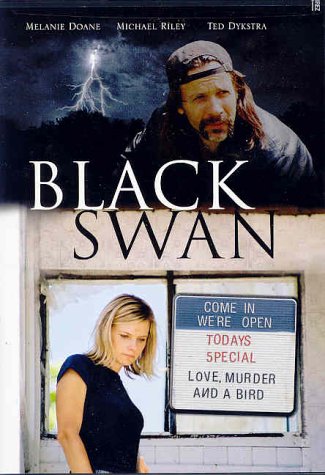½*/**** Image D Sound C Extras B
starring Melanie Doane, Janet Monid, Michael Riley, Ted Dykstra
screenplay by Wendy Ord and Matt John Evans
directed by Wendy Ord
by Walter Chaw Wendy Ord’s Black Swan had me at “I’m tellin’ you, there were traces of blood on that feather.” The film is a dedicatedly stupid murder-mystery/small-town hick opera featuring your standard collection of comely waitresses bound for better things, saucy diner matrons, scumbags with sidekicks, stolid policemen, preternaturally bright children, and literal idiot savants. Set in a tiny hamlet in the Great White North (“Hopeville,” natch), the picture opens with an indecipherable prologue that cuts between three separate storylines: a bunch of teens in a car; the titular black swan doing whatever it is that large waterfowl do at night; and a pair of scumbags going through their nocturnal rituals. The rest of the film follows suit by stuttering between two children playing hooky, a cute waitress (Melanie Doane) flirting with a drifter while dreaming, Steve Earle-like, of getting out of Dodge, and of an investigation of a possible serial killer who leaves black swan feathers at the scenes of his crimes.
Juggling typical Lifetime Channel concerns like abusive redneck beaus, the lovably-disabled, and precocious tots on an allegorical adventure, Black Swan compounds its saccharine-nothings with a score by Canuck songstress Doane’s brother Creighteon’s Loreena McKennitt-lite ditties. The dialogue is pretty excruciating, a condition matched by the performances (though Doane acquits herself decently with her older and ganglier Kirsten Dunst shtick) and exacerbated by the near-surrealism of the narrative. When the lovable drifter (Ted Dykstra) pulls out a gun and opens fire on a bunch of joy-riding teens, it marks a paralyzed moment in the film where it is simultaneously the most like Luis Buñuel and the most like a jigsaw puzzle pounded together by an emotionally-troubled rooster.
Ord’s digital video looks just awful, ameliorating the effect of the presumably lovely Canadian landscape and causing one to reopen the debate as to whether it’s actually a good thing that anyone can make films now with the cheaper technology. Straining to be lighthearted, by its end, the movie reminds of all the parts of the British flicks I particularly hate: local flavour seen through the eyes of gaffed natives drunk on mighty draughts of provincialism and Garrison Keillor hominess. It might hold some interest for folks starving for greater Canadian representation in the cinema, but then again, it might cause the same to cringe. After all, there’s a crucial difference between positive representation and any representation.
THE DVD
Lions Gate offers Black Swan on a platter that promises a full-frame presentation of the pic but delivers instead an anamorphic 1.85:1 transfer–not that I’m complaining. Unfortunately, the image is badly pixelated and riddled with a tremendous amount of processing error and grain. Scenes involving a kid are oversaturated enough to cause one to fiddle around with one’s television set, though it becomes clear through listening to the commentary track that the unevenness in tint is intentional for some reason or another. A Dolby 5.1 audio mix only really gets a workout during the numerous swells of the score. Alas, the music consistently obscures the dialogue. The same problem is not as notable in the Dolby 2.0 alternative, thus it is the preferable option.
A feature-length yakker by hyphenate Ord and actors Doane and Michael Riley is affable enough, with a not-overwhelming amount of self-congratulation. The 18-day shoot is remembered with some fondness and bonhomie, and while not many moments in this commentary provide much in the way of illumination, it’s a pleasant way to revisit the film if you happen to believe that the film is worth revisiting. There’s nary a dead spot and the plot synopsis in which it indulges is actually welcome. The best moment comes, however, when it’s revealed that the actor playing the idiot savant (Matt John Evans) is a co-writer of the film.
A music video for Doane’s “Still Desire You” is directed by Ord and recalls the disappointment I felt when, a few years ago, I picked up Doane’s debut CD on a trip to Vancouver based on a little snippet I caught in a record store. Hers is bland femme-pop of the alterna-safe variety (“You like to fight about stupid stuff, leave the seat up if you must”), the sort of pap that makes Alanis Morrissette suddenly seem relevant and courageous. The video itself is a lot of scenes from the flick interspersed with pretty Doane in blue sequins. An extended outtake reel is the usual collection of missed lines and giggle fits; perverse fun can be had, however, from the five-year-old thespians pathologically falling down.
91 minutes; NR; 1.85:1 (16×9-enhanced); English DD 5.1, English DD 2.0 (Stereo), French DD 2.0 (Stereo); DVD-9; Region One; Lions Gate




![The Rocky Horror Picture Show (1975) + Shock Treatment (1981) [Bodice-Ripping Fabulous 3-Disc Set] - DVD 6a0168ea36d6b2970c017ee3d3e4d7970d](https://i0.wp.com/filmfreakcentral.net/wp-content/uploads/6a0168ea36d6b2970c017ee3d3e4d7970d.jpg?resize=150%2C150&ssl=1)


